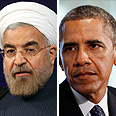
Rohani and Obama
צילום: רויטרס, AFP
The president is in love
Op-ed: US has no intention of striking in Iran, and Israel won't be able to attack behind Obama's back
I recently took part in a series of closed discussions on the "dramatic change" in Iran, with the participation of some of our best minds and some of the most prominent experts in the Arab world. The common denominator was immediately evident: They were all concerned by the "charm offensive" of new Iranian President Hassan Rohani, and no one believed that Iran would agree to abandon the nuclear option.
Tehran did come to the negotiations in Geneva with some good intentions. It is easy to see the tight connection between the economic sanctions imposed on Iran and the task given by Supreme Leader Khamenei to Rohani: To get as many "trust building measures" from the Americans that will lead to the swift easing of sanctions. In return, the Iranians, like traders at a bazaar, will offer small concessions such as increased supervision on the nuclear facilities, where they will make sure that the uranium enrichment laboratories remain hidden.
Rohani himself revealed the cards when he made it clear that Iran's nuclear scientists would not be unemployed and that nuclear development is an absolute right of the Islamic Republic. If this is the situation, what is there to negotiate about? They are negotiating on the time Iran will have to build a bomb. Israel says Iran will be able to build a bomb in a year – more or less – while the government in Washington says it will take Iran three to five years. If the West's representatives apply pressure on the Iranians during the negotiations in Geneva, they may be able to get a "concessions" package from them, but Tehran will not fold.
The Arab experts are just as concerned as our experts are. I haven't seen such frustration and helplessness in Saudi Arabia, Egypt, Jordan and the Gulf states in a long time. Not only have America's old allies been betrayed by Obama, now they don't have anyone to lean on when the "big brother" in Washington is enthusiastic at their expense.
Suddenly, the Arab world is no longer divided into a moderate camp and an extremist camp. The dramatic developments have stretched a separation line between two fields: The Sunni field, which looks like a dried out, wrinkly woman, and the Iranian-Shiite arena, which is becoming popular and challenging. If we take our eyes off it for a second, we will be on the receiving end of a very dangerous response.
The Institute for National Security Studies near Tel Aviv University recently held a seminar on the Iranian issue. Some of the speakers supported the "no other choice" negotiations with the Iranians, while others insisted that the Iranians are trying buy time and throw sand in the eyes of the Western representatives. The pressure caused by the sanctions is extremely dangerous to the regime in Tehran. Should the Revolutionary Guards fail to block the millions of youngsters who have nothing to lose, Khamenei and the Guards are in for a shake-up.
The "bombing or bomb" formula has expired. Washington has no intention of attacking Iran, while Jerusalem warns that it will take "measures of its own." But we will not be able to attack Iran behind the back of the administration in Washington.
So what is there left for us to do? Cooperate with the Sunni camp that has opened up to us behind the scenes and continue to pressure the West so that sanctions are not lifted before the Iranian nuclear program is halted. The sanctions and economic isolation have proven to be effective, so we must make certain that the gentleman from the White House continues to hold the whip and prove that he is not abandoning his allies.
But this won't be easy. The Iranian charm is challenging Obama and his people. They should be reminded of the proper way to treat those who are trying to deceive them.










